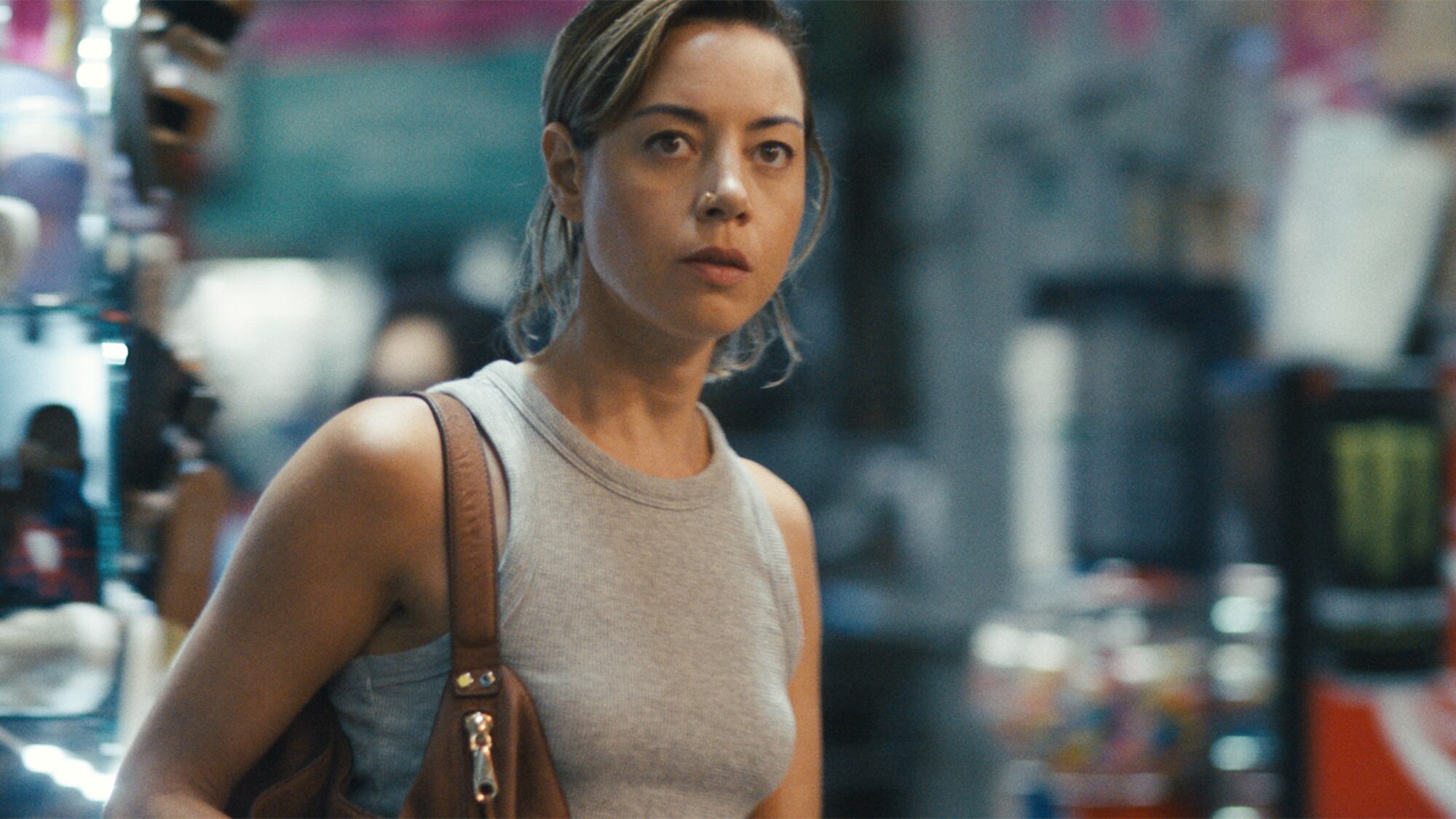EMILY THE CRIMINAL
**** How about that title? In three words, Emily the Criminal lays out its entire story: An ordinary person becomes an extraordinary lawbreaker. With empathy and efficiency, first-time feature director John Patton Ford tells the tale without getting in the way of his ferocious star, Aubrey Plaza. As Emily Benetto, a woman reduced to Sisyphean food-delivery gigs by college debt and an assault conviction, Plaza endures indignity with defiance. The film begins with Emily lashing out at a condescending jerk during a job interview, revealing an inner steel that later serves her well in a lucrative new occupation: buying electronics with stolen credit card information for a handsome schemer named Youcef (Theo Rossi). It’s a slightly suspicious premise, but just when Emily the Criminal threatens to become a salacious “dummy shopping is the new Tinder” fantasy, Ford’s grandly dark ambitions become clear. While another filmmaker might have seen Emily as a cautionary tale—a working woman whose life affirms the immutable laws of class—Ford sees a screwed-over millennial whose wrath and cunning have reached a boiling point. The robberies make you sweat, but so does a verbal showdown with a boomer executive (Gina Gershon) who snidely tells Emily that when she was her age, she could only dream of being a secretary. “At least secretaries get paid!” Emily snaps. It’s a hell of a comeback—and a perfect distillation of the generational rage that fuels the film. R. BENNETT CAMPBELL FERGUSON. Bridgeport, Fox Tower, Hollywood.
WAITING FOR BOJANGLES
**** Director Régis Roinsard’s adaptation of Olivier Bourdeaut’s bestselling debut novel starts where most cinematic love stories end, which doesn’t bode well for its central couple. The film opens with Georges (Romain Duris) lying his way through a party when he spies the glamorous Camille (Virginie Efira) dancing alone across the room. Instantly smitten with each other, they bond over fantasy backstories and run away to live happily ever after, living with blatant disregard for the consequences of their behavior. It seems like a romantic notion until the birth of their son, Gary (Solan Machado Graner), which forces Georges to face the reality of raising a family with the French equivalent of a Manic Pixie Dream Girl—while Camille succumbs to psychosis. As Gary watches his parents (and his world) crumble, Waiting for Bojangles emerges as a love story that goes beyond the chase and peers into the gritty emotional battle between what’s real and what we perceive to be love. It’s an uneasy thrill ride full of uncertainty, as any great love story should be. NR. RAY GILL JR. Fox Tower.
ALIENOID
*** Storytelling without boundaries asks a lot of an audience, but writer-director Choi Dong-hoon (The Thieves, Assassination, Tazza: The High Rollers, Jeon Woo-chi: The Taoist Wizard) is a filmmaker you can trust. His epic Korean blockbuster Alienoid handles genre-bending storytelling with a delicate balance of humor and action, creating a boundless adventure that is the first part of a two-film saga set during the Goryeo Dynasty (918-1392), the present day, and the future. To sum it up as simply as possible, the film features an array of characters who employ everything from sorcerer powers to otherworldly technology in pursuit of a mystical, time-traveling blade. Yeah, it’s a lot. But the action is a beautiful ballet of martial arts and sci-fi with real stakes—and the film avoids saturating itself in CGI with practical effects that somehow feel more real than they look. Choi’s dizzying fusion of genres and a nearly two-and-a-half-hour runtime may alienate some viewers, but those who allow themselves to be immersed in the movie will be rewarded with an amazing jumping-off point for part two. NR. RAY GILL JR. Eastport.
THE GOOD BOSS
** Oscar winner Javier Bardem gives a memorable performance as the titular character in this otherwise feckless shot at the corporate elite. Written and directed by Fernando León de Aranoa, The Good Boss chronicles corruption in Spanish labor markets from the perspective of employees impacted by their bosses’ decisions over the course of eight days. Bardem plays Blanco, the head of a family-run company that produces industrial scales (a metaphor for the film’s preoccupation with power imbalances). With the company up for an award that Blanco is desperate to receive, he embraces familiar and manipulative tactics, like referring to his employees as family and espousing the benefits of sacrifice and loyalty. Unfortunately, more interesting stories fade, leaving Bardem to deliver a moral message that doesn’t land. “Sometimes, you have to trick the scale to get the exact weight,” Blanco says. In a story too flat to care about, even Bardem can’t trick you into thinking The Good Boss is a well-balanced film. NR. RAY GILL JR. Living Room.

